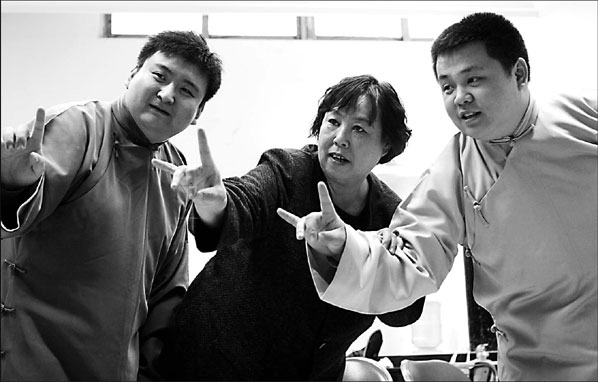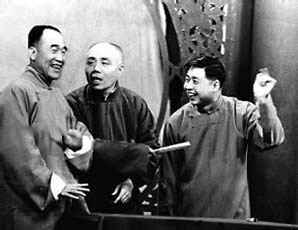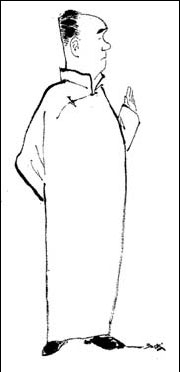Funny business
|
Ma Guirong coaches her students on a xiangsheng (comic cross talk) work. Guo Yingguang |
When cross talk performers are sparring back and forth with exaggerated facial expressions and humorous speech, few are concerned with the scenarists behind the curtain. Ma Guirong, a prolific scenarist for many well-known cross talk shows, has drawn attention for her efforts of adding laughter and luster to our lives.
Every Sunday at noon, Ma and her students give a cross talk show at the Haidian Theater in Beijing. The instructor in the Children's Palace of Xicheng district is proud to see some of her young disciples winning prizes at teenager cross talk competitions. "Their praise can be a tonic for me," Ma says.
The talk of two comedians (sometimes one or more actors are involved) known as xiangsheng is one of the most popular forms of entertainment in China. By vivid and rich descriptions of characters and events, it is intended to express thought-provoking matter behind the humor.
Xiangsheng disciples used to go through strict training by rigid instructors. But Ma set up her xiangsheng club named Xiaohaha Culture and Art Group at the Children's Palace in 1997 "for children's interests" instead of strict professional training.
More than 100 students attend her classes or join performances over the weekends. She splits trainees into three classes according to their age and tutors them separately.
|
Xiangsheng masters Hou Baolin (left), Liu Baorui and Ma Ji in a rare performance. File Photo |
Young children at about 5 usually begin with tongue twisters. Teenagers recite whole passages at a time, while university students learn longer pieces.
Ma, 49, was born in Beijing's hutong alley and became addicted to xiangsheng programs on the radio from childhood. She recited the dialogue and mimicked the performers' voices. At 9, she began writing dialogue on her own.
In the late 1970s, Ma worked in a public bathhouse, handing out slippers and soaps to customers. She continued writing xiangsheng scripts. Her anecdotes, which are then adapted into sketches, have won her great acclaim.
She ridicules stereotypes in films, like people who play translators always wear glasses.
In 1987, she started writing xiangsheng scripts full-time, contributing to professional cross talkers, ensembles and TV stations. Household names such as Feng Gong and Niu Qun have performed her works for millions.
Her masterpiece, Package Change (Huan Baozhuang), a word game that she said was seldom seen in xiangsheng, won the 9th Wenhua Award from the Ministry of Culture in 2000. It was the first time that a xiangsheng piece had won such a prestigious honor.
"People often ask me how I find these sources for my work," Ma says, smiling. "I'm not a super star, I live an ordinary life like anyone else, facing rising prices, traffic jams and expensive houses beyond reach."
Ma believes a qualified cross talk play writer should have both insight and foresight. "Things aren't always as they appear. The writer should grasp the essence of life," she says.
In 1993, Ma sent a story titled A Lonely Man Seeking Help to a competition. The story is about a heartbroken young man standing on the top of a building, planning to commit suicide as the crowds just passed him by. Ma was asked to revise the last part, making the crowd trying to save the young man.
One function of cross talk is satire, Ma says. Though her revised work was highly praised, she is dissatisfied that it doesn't show her original satire. "Our society is not as perfect as we expect. There are always conflicts. We don't need to hide them."
Ma greatly admires xiangsheng master Hou Baolin (1917-93). Hou once said many people regarded xiangsheng only as a show, or a handy step towards political gain. But he had always treated xiangsheng as the most important pursuit in his life.
In the early 20th century, folk artists, who made little money, had to come up with interesting stories to hold the audience's attention. "No cracking good show, no bread," Ma says. "It was poverty that pushed the early xiangsheng artists to polish the works until they were perfect."
Ma feels sorry for present comic stars and film stars who live in huge villas far away from the common folks.
|
Cartoonist Fang Cheng depicts Hou Baolin in his trademark gown.File Photo |
"They don't understand what the poor feel when the rain trickles into the bungalow. The common people are anxious about the high medical costs, while the stars spend large sums on their pets' cosmetic surgery," Ma says. "Their speeches, manners and works cannot reflect what the public really want to say. Just as the old saying goes - a hero is known in the time of misfortune."
With a pension of 1,000 yuan ($140) per month from the children's palace, Ma's family is not well off. Although her works can be seen on CD or DVD shelves across the country, she has not been paid well, which is a common dilemma faced by scriptwriters of films, songs and dramas in the country.
"Few xiangsheng script writers have access to top-notch performers. It is my honor to be involved in the cross talk circle," she says.
In recent years, she has put a lot of effort into xiangsheng teaching. Tang Yichen, a fifth-grader, has studied with Ma for two months. At home, the boy often locks himself in his own space, honing his cross-talking skills.
"I bring him to the children's Palace, hoping to develop his personality," says Chen Qing, Tang's mother.
It is a common practice for Chinese parents to send their children to learn piano, painting, English, math and other courses outside school.
Chen hopes that learning xiangsheng will nurture the boy's sense of humor. "He asked for the classes," says Chen, adding that he likes playing trombone and ping pang.
Ma says that her students aren't learning xiangsheng so they can make money. They attend her classes to form a positive view of life.
"Most urban children enjoy ample food, a good education and a nice home environment, so they have 50-50 chance. It is personality, a sharp-wit and a sense of humor that give people the upper hand," Ma says.
(China Daily 04/29/2008 page20)

















